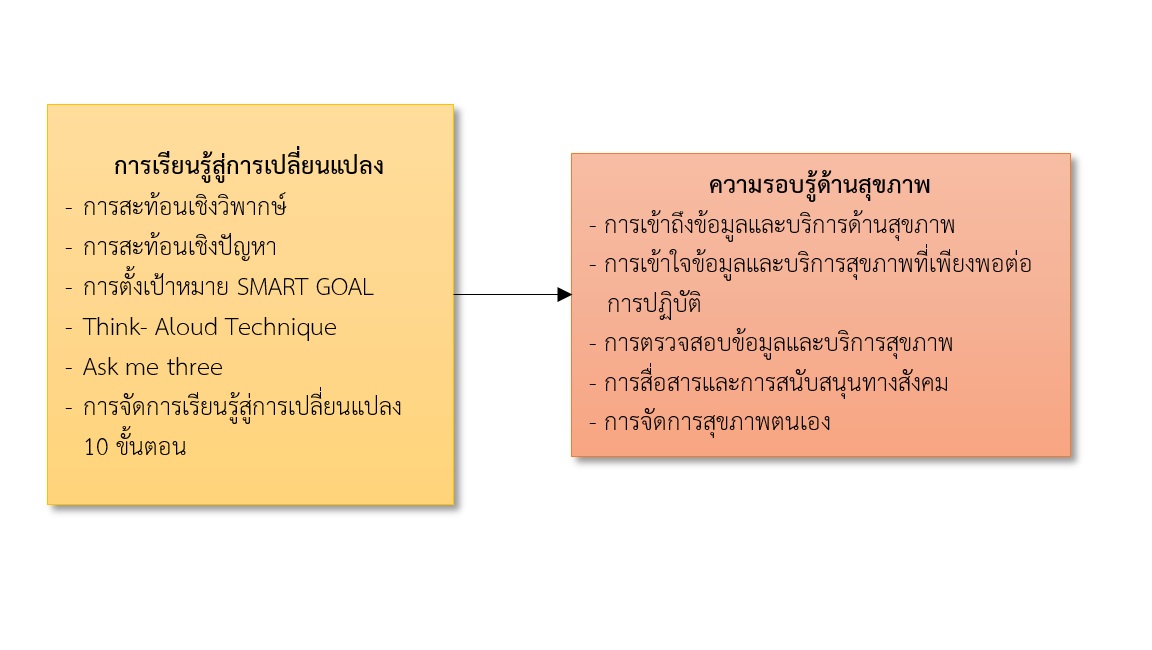ประสิทธิผลของโปรแกรมการเรียนรู้เพื่อการเปลี่ยนแปลงต่อการส่งเสริมความรอบรู้ด้านสุขภาพในผู้สูงอายุโรคเบาหวาน
คำสำคัญ:
ความรอบรู้ด้านสุขภาพ, โรคเบาหวาน, การเรียนรู้เพื่อการเปลี่ยนแปลง, ผู้สูงอายุโรคเบาหวานบทคัดย่อ
การวิจัยกึ่งทดลองหนึ่งกลุ่มทดสอบก่อนและหลังนี้ มีวัตถุประสงค์เพื่อส่งเสริมความรอบรู้ด้านสุขภาพโดยโปรแกรมการเรียนรู้เพื่อการเปลี่ยนแปลงในการส่งเสริมความรอบรู้ด้านสุขภาพ โดยเฉพาะในระดับปฏิสัมพันธ์และระดับวิจารณญาณ กลุ่มตัวอย่างคือผู้สูงอายุโรคเบาหวานที่รับการรักษาที่โรงพยาบาลส่งเสริมสุขภาพแม่สา จำนวน 30 คน ได้มาจากการสุ่มแบบเฉพาะเจาะจง โดยกลุ่มตัวอย่างเข้าร่วมโปรแกรมการเรียนรู้เพื่อการเปลี่ยนแปลงต่อการส่งเสริมความรอบรู้ด้านสุขภาพสำหรับผู้สูงอายุโรคเบาหวานจำนวน 4 ครั้ง เครื่องมือวิจัยประกอบด้วย 1) แบบวัดความรอบรู้ด้านสุขภาพ ค่าความเชื่อมั่นเท่ากับ 0.86 2) โปรแกรมส่งเสริมการเรียนรู้เพื่อการเปลี่ยนแปลงในการสร้างเสริมความรู้ด้านสุขภาพ 3) คู่มือส่งเสริมความรอบรู้ด้านสุขภาพของผู้สูงอายุโรคเบาหวาน การตรวจสอบคุณภาพเครื่องมือโดยการตรวจสอบความตรงเชิงเนื้อหา วิเคราะห์ข้อมูลโดยการใช้สถิติพรรณนาและการวิเคราะห์ความแตกต่างของค่ากลางของสองประชากรไม่อิสระของค่ากลางของกลุ่มตัวอย่าง ผลการวิจัยพบว่า
1. ความรอบรู้ด้านสุขภาพของกลุ่มตัวอย่างทั้งก่อนและหลังการเข้าร่วมโปรแกรมฯ อยู่ในระดับพอใช้ (M=149.29, SD=23.87, M=178.26, SD=29.08)
2. ความรอบรู้ด้านสุขภาพของกลุ่มตัวอย่างหลังเข้าร่วมโปรแกรมสูงกว่าก่อนเข้าร่วมโปรแกรมอย่างมีนัยสำคัญทางสถิติ (p<.001)
ควรนำไปเป็นข้อมูลพื้นฐานในการส่งเสริมบทบาทของพยาบาลในการส่งเสริมความรอบรู้ด้านสุขภาพของผู้สูงอายุโรคเบาหวาน สำหรับด้านการศึกษาวิจัยควรมีงานวิจัยในการติดตามการศึกษาระยะยาวและเน้นความรอบรู้ด้านสุขภาพระดับวิจารณญาณ
เอกสารอ้างอิง
Chiangkhong, A, Intarakamhang, U, Duangchan, P., & Macaskill, A. (2019). Effectiveness of Health Literacy through Transformative Learning of Glycemic control in Diabetic Adults. The Journal of Behavioral Science, 14(3), 49-61.
Grove, S., Burns, N., & Gray, J. (2013). The Practice of Nursing Research. Appraisal, Synthesis, and Generation (7ed). Missouri; Elesevier Saunders.
Division of Non Communicable Disease. (2020). Number and Rate of Non- Communicable Disease Mortality. Retrieved from http://www.thaincd.com/2016/mission/documents-detail.php?id=13653&tid=32&gid=1-020
Ginggeaw, S., & Prasertsri, N. (2016). The Relationship Between Health Literacy and Health Behavior Among Older Adults who have Multi-Morbidity. Nursing Journal of the Ministry of Public Health, 25(3), 43-54. (in Thai)
Gray, J, R., Grove, S, K., & Sutherland, S. (2016). Burns and Grove’s the Practice of Nursing Research, 8eds. Philadelphia: Elsevier.
Intarakamhang, U. (2017). Health Literacy: Measurement and Development. Bangkok: Pimluck. (in Thai)
Kooshyar, H., Shoorvazi, M., Dalir, Z., & Hosseini, M. (2014). Health Literacy and its Relationship with Medical Adherence and Health-Related Quality of Life in Diabetic Community-Residing Elderly. Journal of Mazandaran University of Medical Sciences, 23(1), 134-143.
Lee, Y. J., Shin, S. J., Wang, R. H., Lin, K. D., Lee, Y. L., & Wang, Y. H. (2016). Pathways of Empowerment Perceptions, Health Literacy, Self-Efficacy, and Self-Care Behaviors to Glycemic Control in Patients with Type 2 Diabetes Mellitus. Patient Education and Counseling, 99(2), 287-294.
Maschak-Carey, B. J. (2014). Chapter 41 Assessment and Management of Patients with Diabetes mellitus. In B. G. Bare, J. L. Hinkle, & K. H. Cheever (Eds.), Brunner & Suddarth s Textbook of Medical-Surgical Nursing (13thed.)(pp. 1196-1244). Philadelphia: Wolters Kluwer Lippincott Williams & Wilkins.
Mezirow, J. (1992). Transformative Learning: Theory to Practice. New Directions for Adult and Continuing Education, 1997(74), 5-12.
Mezirow, J. (2000). Learning to Think Like an Adult: Core Concepts of Transformation Theory. In J. Mezirow (Ed.), Learning as Transformation: Critical Perspectives on a Theory in Progress. San Francisco: Jossey-Bass.
Ministry of Public Health. (2015). Public Health Statistics A.D. 2017. Retrieved from http://www.pcko.moph.go.th/Health-Statistics/stratistics60.pdf (in Thai)
Montoya, M. F. (2015). The Association Between Health Literacy and Diabetes Outcomes and Self-Management Behaviors among Older Adults in the US. Retrieved from https://www. semanticscholar. org/paper/The-Association-between-Health-Literacy-and-and-in-Montoya/4aafd47390f0fe6b93a0090d5d082504a4f11bc2.
Muller, I., Rowsell, A., Stuart, B., Hayter, V., Little, P., Ganahl, K., et al. (2017). Effects on Engagement and Health Literacy Outcomes of Web-Based Materials Promoting Physical Activity in People with Diabetes: an International Randomized Trial. Journal of Medical Internet Research, 19(1), e21
Nitri, D. W., & Stewart, M. (2009). Transformative Learning Intervention: Effect on Functional Health Literacy and Diabetes Knowledge in Older African Americans. Gerontology & Geriatrics Education, 30(2), 100-113.
Nguyen, H. T., Kirk, J. K., Arcury, T. A., Ip, E. H., Grzywacz, J. G., Saldana, S. J., et al. (2013). Cognitive Function is a Risk for Health Literacy in Older Adults with Diabetes. Diabetes Research and Clinical Practice, 101(2), 141-147.
Nutbeam, D. (2000). Health Literacy as a Public Health Goal: a Challenge for Contemporary Health Education and Communication Strategies Into the 21st Century. Health Promotion International, 15(3), 259-267.
Prabsangob, K. (2016). Relationship of Health Literacy and Self-Care Behavior among Type 2 Diabetic Patients in Banpong District, Ratchburi Province. The 7th NEU National and International Conference 2020 (NEUNIC 2020) “Learning Innovation for Community Development”, 1(1), 2858-2869. (in Thai)
Rakpanusit, T., Khoyneung, N., Isaramalai, S., & Kuha, A. (2020). Effects of Health Literacy and Self- Perceived Health Status on Quality of Life of Elderly in Three Southern Border Provinces of Thailand. The Sothern College Network Journal of Nursing and Public Health, 7(3), 182-194. (in Thai)
Rattanapongsai, P., Lakhampan, S., & Pitchayapinyo, P. (2016). Effectiveness of the Giving Program Knowledge of Drug Use and Drug Collaboration Among Patients with Uncontrol Type 2 Diabetes Mellitus. Thai Journal of Nursing Councli, 31(4), 50-62. (in Thai)
Reisi, M., Mostafavi, F., Javadzade, H., Mahaki, B., Tavassoli, E., & Sharifirad, G. (2016). Communicative and Critical Health Literacy and Self-care Behaviors in Patients with Type 2 Diabetes. Iranian Journal of Diabetes and Etabolism, 14(3), 199-208.
Ruckbumnet, C. (2020). An Expenditure Budget Burden for the Health Care System. Parliamentary Budget Office. Retrieved from https://www.parliament.go.th/ewtadmin/ ewt/ parbudget/ewt_dl_link.php?nid=478. (in Thai)
Sugita, H., Shinohara, R., Yokomichi, H., Suzuki, K., & Yamagata, Z. (2017). Effect of Text Messages to Improve Health Literacy on Medication Adherence in Patients with Type 2 Diabetes Mellitus: A Randomized Controlled Pilot Trial. Nagoya Journal of Medical Science, 79(3).
Suksathan, W., & Prabsangob. (2016). Health Literacy and Self-Care Behavior in Elderly with Diabetes in Ratchaburi Province, Thailand. International Journal of Management and Applied Science, 2(11), 21-24. (in Thai)
Supannakul, P., & Sritong, W. (2015). Causal Relationship Model of Factors Influencing Glycemic Control Behavior Among Monks with Type 2 Diabetes in Upper Northern Region of Thailand. Behavioral Science Research Institute. 21(1), 95-109. (in Thai)
Souza, J. G., Apolinario, D., Magaldi, R. M., Busse, A. L., Campora, F., & Jacob-Filho, W. (2014). Functional Health Literacy and Glycaemic Control in Older adults with Type 2 Diabetes: a Cross-Sectional Study. BMJ Open, 4(2), e004180.
Thammapol, P., Piasue, N., & Jarupatmaruo. (2016). Health Literacy, Personal Factors, Clinical Health Outcomes, Patients Living with Hyoertension, Dyskipidemia, Type 2 Diabetes Mellitus. Journal of Nursing and Health Care, 34(3), 176-182. (in Thai)
Wanichkul, N., Pungpasuk S., Tursakulkeaw, T., & Utariyaprasit, K. (2017). Relationship of Health Literacy, Results of Obtaining Health Knowledge, and Social Influence with Clinical Outcomes of Type 2 Diabetes and/ or Hypertension. Journal Thailand Nursing and Midwifery Council, 32(2), 111-125. (in Thai)

ดาวน์โหลด
เผยแพร่แล้ว
ฉบับ
ประเภทบทความ
สัญญาอนุญาต
1. บทความหรือข้อคิดเห็นใด ๆ ที่ปรากฏในวารสารเครือข่าย วิทยาลัยพยาบาลและการสาธารณสุขภาคใต้ ที่เป็นวรรณกรรมของผู้เขียน บรรณาธิการหรือเครือข่ายวิทยาลัยพยาบาลและวิทยาลัยการสาธารณสุขภาคใต้ ไม่จำเป็นต้องเห็นด้วย
2. บทความที่ได้รับการตีพิมพ์ถือเป็นลิขสิทธิ์ของ วารสารเครือข่ายวิทยาลัยพยาบาลและการสาธารณสุขภาคใต้







